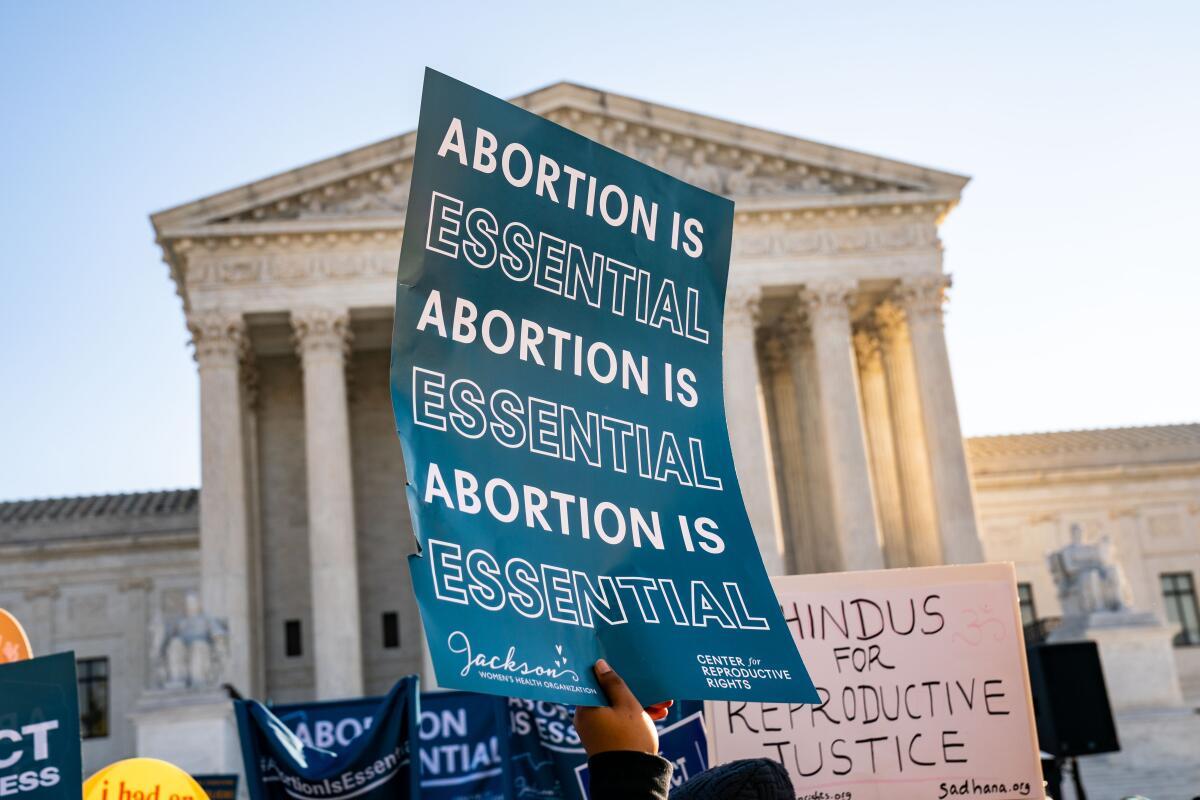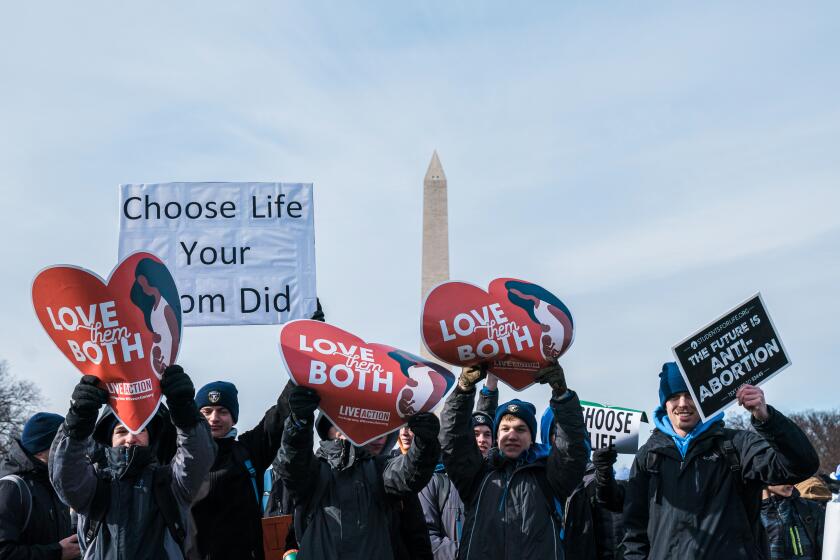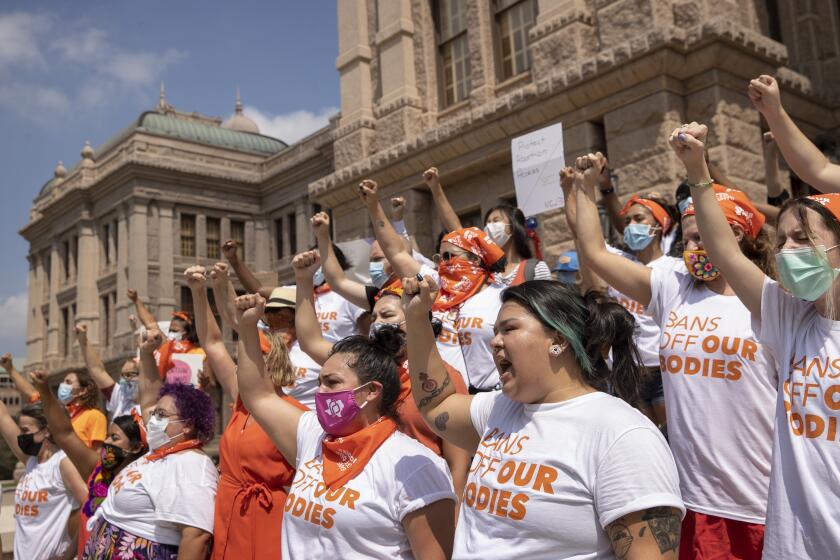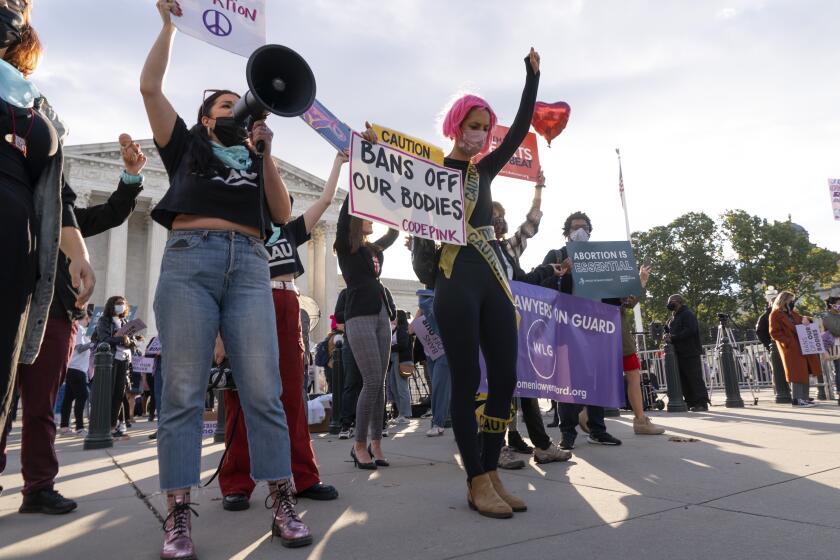Op-Ed: Why I’m telling my abortion story now

- Share via
I am an outspoken advocate for gender equality and women’s rights, and as the leader of Planned Parenthood in California, the state’s largest network of community health centers providing sexual and reproductive healthcare, it would seem obvious that I’m not afraid of the word “abortion.”
But I haven’t always spoken it directly. And until now, I haven’t told my own abortion story.
You see, I come from a generation that emphasized privacy. We stressed “choice” and the “right to choose” instead of talking straightforwardly about abortion. We tiptoed around it, in effect embracing the notion that abortion was problematic, even shameful, and that it should be legal as a last resort.
But those of us who haven’t yet spoken up cannot be silent any longer. We cannot let abortion be mischaracterized and stigmatized by the divisive, dehumanizing messages of a minority that holds extreme views on this crucial human right.
Conservative statehouses are dropping rape exceptions from abortion bans as they look ahead to the Supreme Court’s expected decision in a major abortion case.
The United States is facing the most consequential year for abortion rights since Roe vs. Wade was decided in 1973. And it isn’t just a matter of the pending Supreme Court decision in Dobbs vs. Jackson Women’s Health Organization, the Mississippi case that is likely to overturn Roe.
When the Supreme Court allowed Texas’ SB 8 to remain in effect last year, the floodgates opened at the state level. More than 500 abortion restrictions have been introduced in more than 40 states so far this year. Idaho recently copied Texas’ ban. Arizona followed Mississippi and Florida in passing a 15-week ban. And just last week Kentucky’s Legislature effectively outlawed abortion in the state by setting new regulations but providing no mechanism to fulfill them.
To counter these state bans and to fight the stigma they perpetuate, Planned Parenthood is asking people to share their personal accounts of abortion. But how can I be part of asking others to make their stories public if I haven’t done the same?
I was 16 years old and sexually active with my boyfriend. I knew deep down I was pregnant but kept hoping that the spotting I was having meant maybe my period was still on the horizon. At that age, I was in a dark tunnel of fear and shame, and I didn’t know how to communicate that I needed help. So I wrote in my journal and on little notes I’d leave around the house, desperate for my mother to discover them, understand what I was going through and to give me the guidance I needed. I wrote that I feared I could be pregnant, that I was considering suicide, that I had never been more afraid.
Federal courts are aiding and abetting an enforcement scheme that’s tantamount to open season on constitutional protections in blue and red states.
In the end, my mother did find my notes. She listened to me, made the appointment and arranged everything from then on. There are not enough words to express the gratitude I have for my mother and for her help in that moment. She drove me to the clinic, paid for the service and cared for me when we got home. I had a supportive family and an uncomplicated abortion. But it remained a nearly taboo subject. In fact, I have never talked about it further with my mother, and to this day, I have no idea if my dad knows.
We have to talk more about abortion. Abortion is healthcare. We know a majority of Americans favor the right to terminate a pregnancy. And we know from a landmark UC San Francisco study that five years later, more than 95% of those who choose to have an abortion continue to say it was the right decision.
Oral arguments in Dobbs vs. Jackson Women’s Health Organization telegraphed a decision that would leave the court with no principled way to adjudicate abortion limits.
It’s time to hear those stories in clear, honest terms. Today’s abortion storytellers are Black, brown, LGTBQ+, young, old, rich, poor, famous and your next-door neighbor. The more they speak out, the more they remind us why abortion should have been destigmatized decades ago.
As we witness state after state implementing cruel and extreme abortion bans, and as we await the likely overturning of Roe vs. Wade, I can’t help but ache for the people who have to navigate a healthcare system hostile to their needs and who find themselves having to travel hundreds of miles to find care that should be easily accessible. I was one of the “lucky” ones. I had a support system. I could afford the care I needed, and I could get it from a nearby provider. But so many people are without support, without the means to seek care, without access to safe medical treatment, and without anyone to lean on.
This is my story, and the story of millions of others like me. I had an abortion. I deserve the life I have today, the family I have and the destiny I was able to pursue. My life now is possible because I had access to appropriate healthcare, to abortion.
Jodi Hicks is the president and chief executive of Planned Parenthood Affiliates of California.
More to Read
A cure for the common opinion
Get thought-provoking perspectives with our weekly newsletter.
You may occasionally receive promotional content from the Los Angeles Times.













